人教新课标必修2 Unit1 Cultural relice Learning about language 过去完成时课件(34张PPT)
文档属性
| 名称 | 人教新课标必修2 Unit1 Cultural relice Learning about language 过去完成时课件(34张PPT) |

|
|
| 格式 | zip | ||
| 文件大小 | 884.3KB | ||
| 资源类型 | 教案 | ||
| 版本资源 | 人教版(新课程标准) | ||
| 科目 | 英语 | ||
| 更新时间 | 2020-02-15 00:00:00 | ||
图片预览


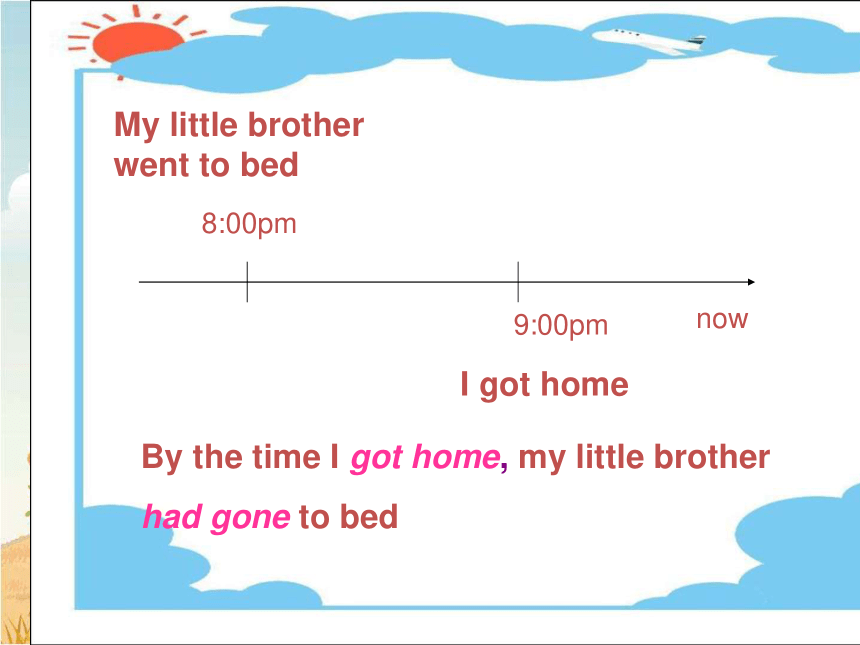
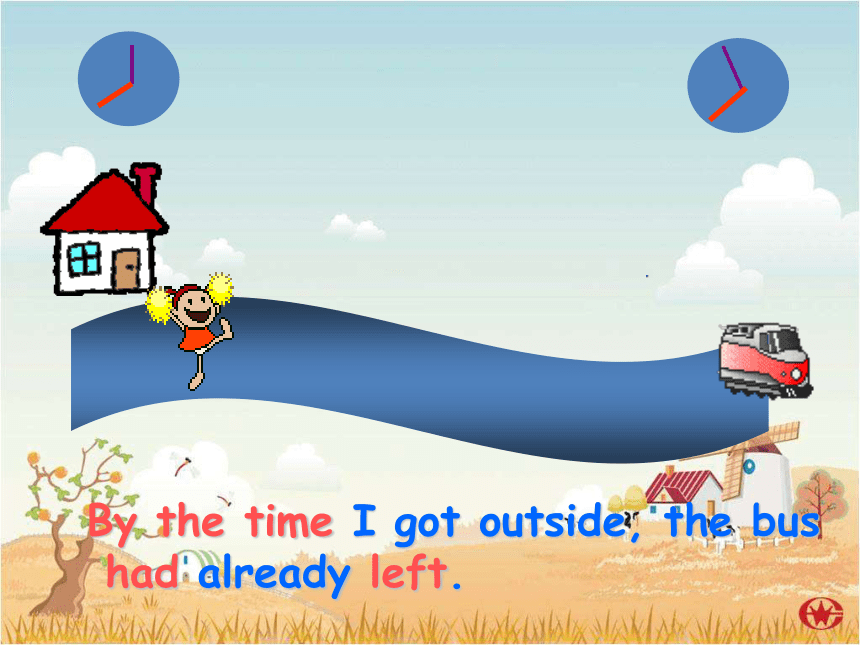
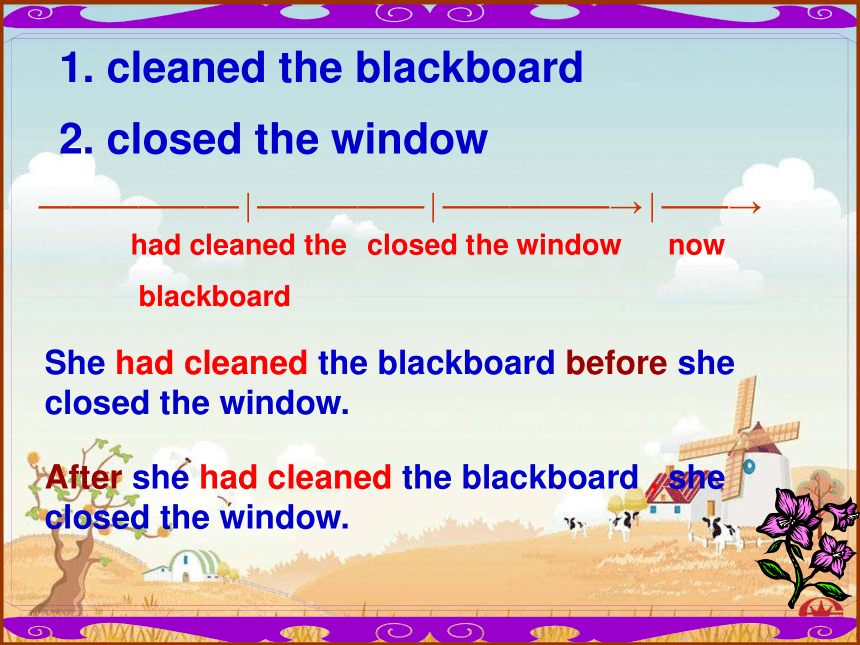
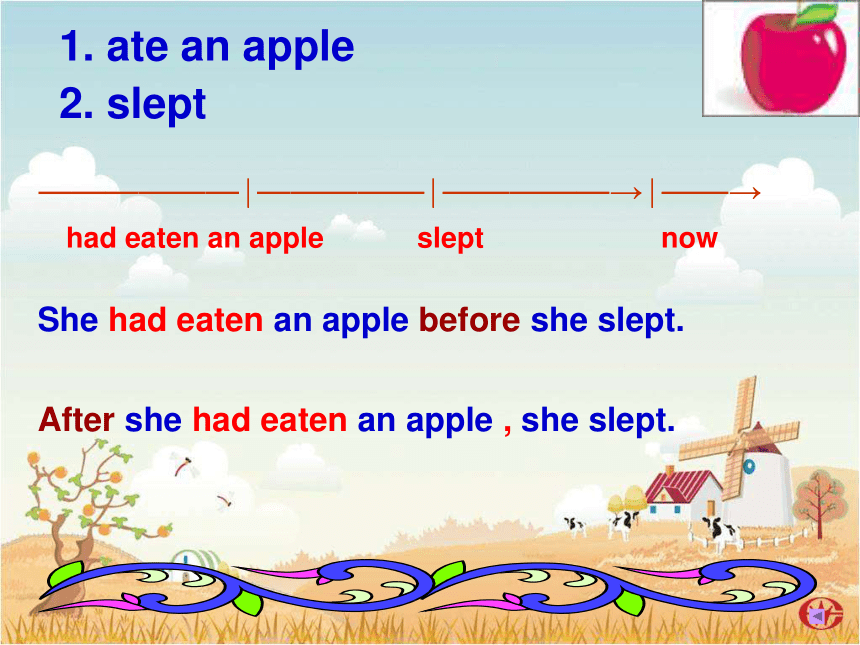
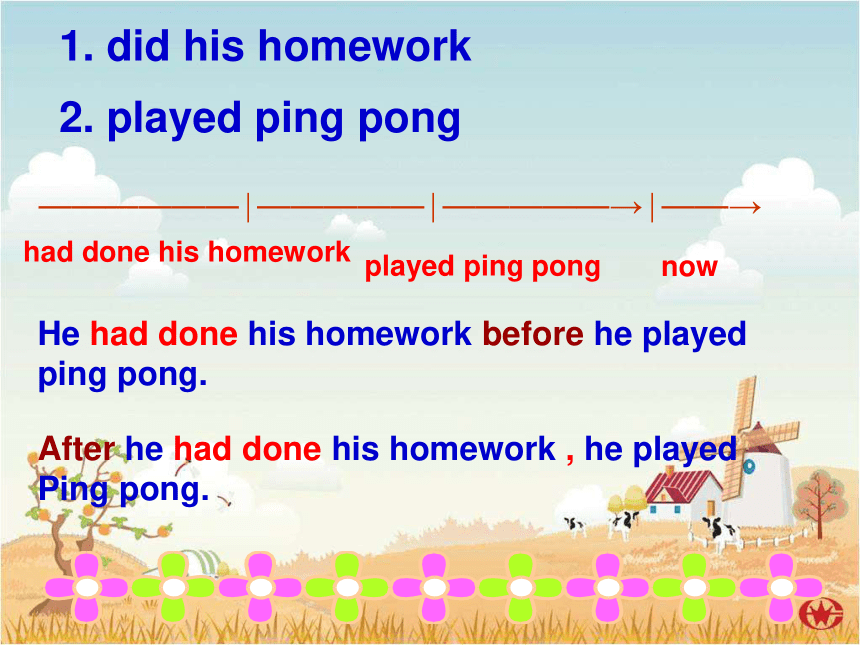
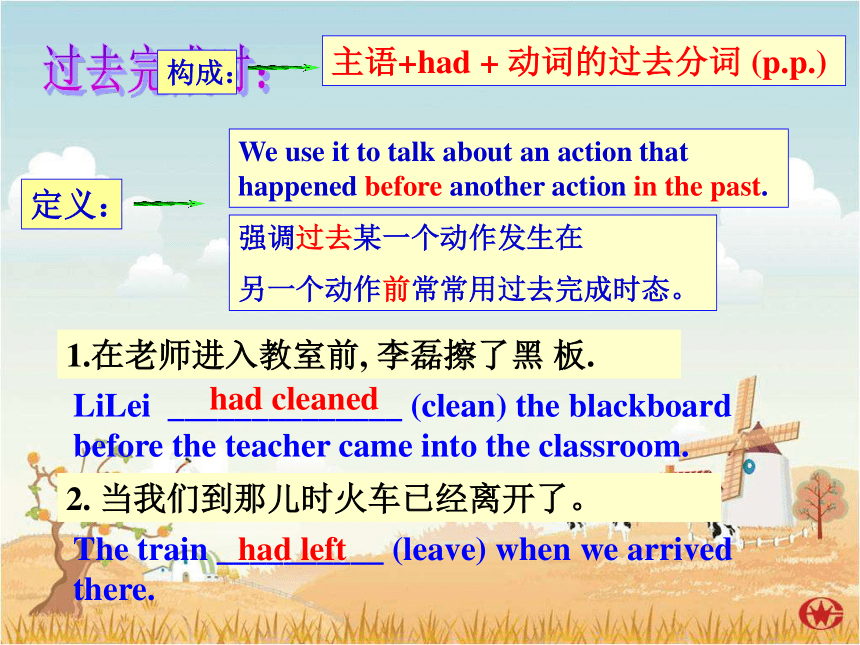

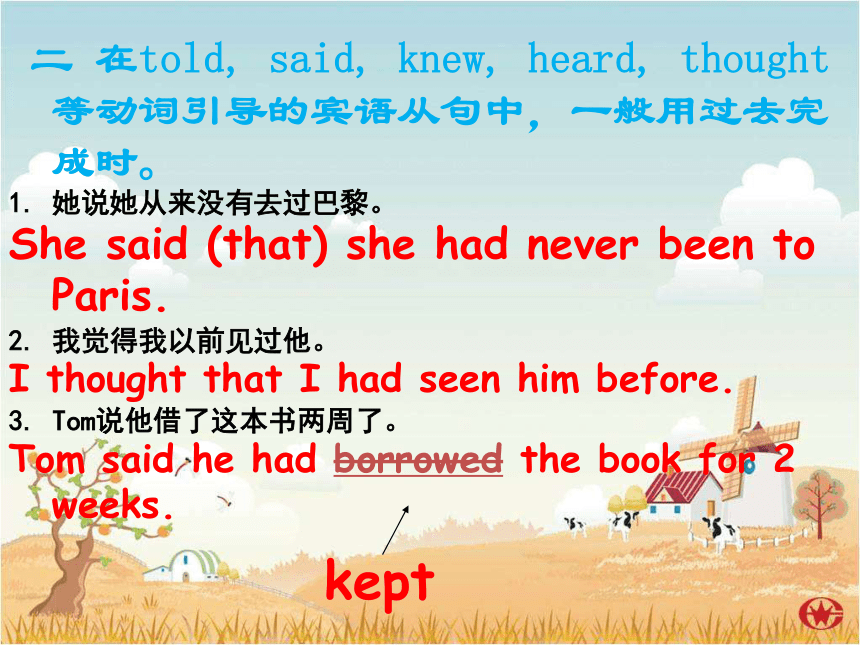

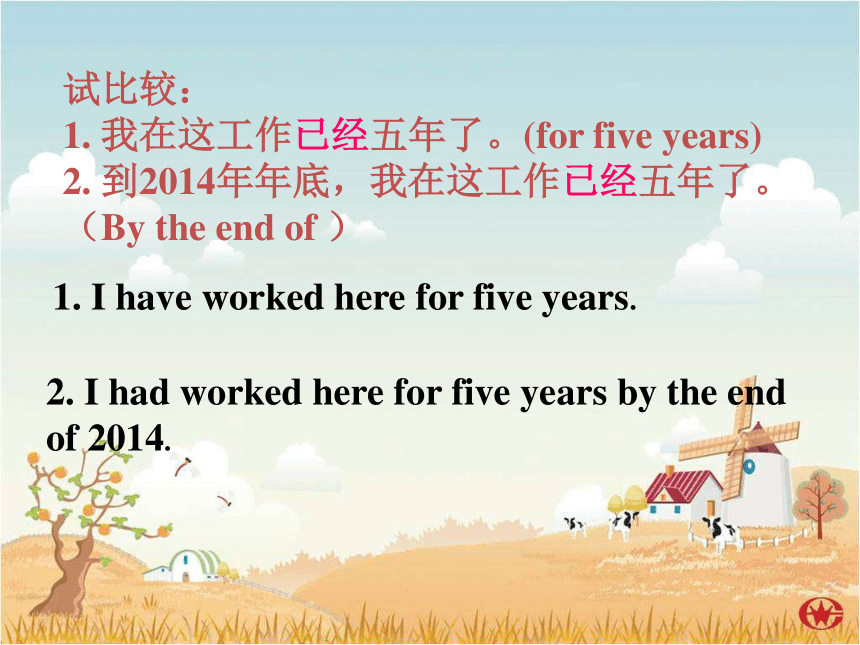
文档简介
课件34张PPT。过去完成时即: 过去的过去构成否定句: had not+ 过去分词肯定句: had+动词的过去分词 一般疑问句:had+ 主语+ 过去分词肯定回答: Yes, 主语+ had.
否定回答: No, 主语+ hadn’t.I got homeMy little brother went to bedBy the time I got home, my little brother
had gone to bedBy the time I got outside, the bus
had already left.1. cleaned the blackboard2. closed the windowhad cleaned the
blackboardclosed the windowShe had cleaned the blackboard before she closed the window.After she had cleaned the blackboard , she closed the window.1. ate an apple2. slepthad eaten an applesleptShe had eaten an apple before she slept.After she had eaten an apple , she slept. 2. played ping pong1. did his homework played ping ponghad done his homeworkHe had done his homework before he played ping pong.After he had done his homework , he played Ping pong.主语+had + 动词的过去分词 (p.p.)定义:过去完成时:强调过去某一个动作发生在
另一个动作前常常用过去完成时态。1.在老师进入教室前, 李磊擦了黑 板.LiLei ______________ (clean) the blackboard before the teacher came into the classroom.had cleaned2. 当我们到那儿时火车已经离开了。The train __________ (leave) when we arrived there.had leftWe use it to talk about an action that happened before another action in the past.构成: 一:过去完成时表示在某一动作之前已经完成的动作. 过去的时间由before, after, when, by the time引导的时间从句表示出来.1. 我在你回来之前就已经把晚饭准备好了.2. 当我赶到学校时, 已经开始上课了.3. 在我到家之前他已经走了.I had finished cooking dinner before you came back.The class had begun when I got to school.He had left before I got home. 二 在told, said, knew, heard, thought等动词引导的宾语从句中,一般用过去完成时。
1. 她说她从来没有去过巴黎。
She said (that) she had never been to Paris.
2. 我觉得我以前见过他。
I thought that I had seen him before.
3. Tom说他借了这本书两周了。
Tom said he had borrowed the book for 2 weeks.
kept试作比较:昨天我见到王先生了.自从他离开北京我们就一直未曾见过面。
I saw Mr. Wang yesterday. We had not seen each other since he left Beijing.
自从他离开北京我们就一直未曾见过面。
We have not seen each other since he left Beijing. 试比较:
1. 我在这工作已经五年了。(for five years)
2. 到2014年年底,我在这工作已经五年了。(By the end of )1. I have worked here for five years. 2. I had worked here for five years by the end of 2014.Competition: If you think you can,
you can. Go-Go加油!用所给动词的正确形式填空.(10’/1)1.The poor girl never saw her grandpa because
he ________________ (pass away) before
she was born.2. She________ already___________ (clean) the blackboard before I entered the classroom.had passed awaycleanedhad句型转换 (10’/1)
He had stood up before he cleaned the window.
_________ he had stood up, he cleaned the window.
His father went to Beijing. He arrived home.
(用before合并句子)
His father______ ______ ____ Beijing before he _________ home.Afterhad gone toarrived按要求改写下列句子.(5’/1)
Simon had finished his homework before he watched TV.
否定句:
疑问句:
肯定回答:
否定回答:Simon hadn’t finished his homework before he watched TV.
Had Simon finished his homework before he watched TV?
Yes, he had.No, he hadn’t.选择题(10’/1)
Millie_____________ some Chinese before she came to China.
A. learned B. has learned C. learnt D. had learned
She ___________ the first runner-up prize in a beauty contest before she __________an actress.
A. have won, became B. had won, become
C. had won, became D. has won, became
改错题(10’1)
We hadn’t seen something interesting in the park before last Sunday.
2. When she woke up this morning, it stopped snowing.anythinghad stopped翻译题(10’1)
1. 在我们到达电影院之前,电影已经开始了.
2. 踢完足球之后我买了瓶果汁.The film ________ _________ ________ we
_____ to the cinema._________ I ________ _________
football, I _________ a bottle of juice.hadbeforegotbegunAfterhadplayedbought写出下列动词的过去完成时形式(5’/1)
be _________________ see_________________
begin _______________ sing_________________
bring________________ open________________had beenhad seenhad begunhad sunghad broughthad openedCandy1. We ___________(learn) two thousands words by the end of last year. Can you do it?3. When we _______(arrive) at the station, they __________(wait) for more than twenty minutes. had learnedarrivedhad waited 4. One of the men couldn’t move, because he __________
(break) his legs. had broken医生到时病人已经死掉了。(patient)
我前几天买的那块表丢了。
她昨天很兴奋,此前她从没有做过飞机。
我到现在还没有去过日本。
Translate them into English
When the doctor arrived, the patient had already died.
I lost the watch (which) I had bought the other day.
She was very excited yesterday. She had never
taken a plane before.
4. I haven’t been to Japan by now.
/ I have never been to Japan by now.
Thank youAAA式AAB式ABA式ABB式ABB式ABC式ABC式特殊lie lied lied 说谎
lie lay lain 平放;躺;位于
lay laid laid 放置;产卵
常用瞬间动词变延续性动词表: 1. have arrived at/in sw. got to/reached sw. come/gone/moved to sw
→have been in sw./at…相应的介词
2. have come/gone back/returned → have been back
3. have come/gone out →have been out
4. have become → have been
5. have closed / opened→ have been close/open
6. have got up → have been up;
7. have died → have been dead;
8. have left sw. → have been away from sw.
9. have fallen asleep/got to sleep → have been asleep;
10. have finished/ended/completed → have been over;
11. have married → have been married;
12. have started/begun to do sth. → have done sth. ;
13. have begun → have been on
14. have borrowed/bought →have kept/had
15. have lost → haven’t had
16. have put on →have worn
17. have caught /get a cold → have had a cold;
18. have got to know → have known
19. have/has gone to → have been in
20. have joined/have taken part in the league/the Party/the army
→have been a member of/ have been in/have been the Party’s member/the league member/the soldier…
否定回答: No, 主语+ hadn’t.I got homeMy little brother went to bedBy the time I got home, my little brother
had gone to bedBy the time I got outside, the bus
had already left.1. cleaned the blackboard2. closed the windowhad cleaned the
blackboardclosed the windowShe had cleaned the blackboard before she closed the window.After she had cleaned the blackboard , she closed the window.1. ate an apple2. slepthad eaten an applesleptShe had eaten an apple before she slept.After she had eaten an apple , she slept. 2. played ping pong1. did his homework played ping ponghad done his homeworkHe had done his homework before he played ping pong.After he had done his homework , he played Ping pong.主语+had + 动词的过去分词 (p.p.)定义:过去完成时:强调过去某一个动作发生在
另一个动作前常常用过去完成时态。1.在老师进入教室前, 李磊擦了黑 板.LiLei ______________ (clean) the blackboard before the teacher came into the classroom.had cleaned2. 当我们到那儿时火车已经离开了。The train __________ (leave) when we arrived there.had leftWe use it to talk about an action that happened before another action in the past.构成: 一:过去完成时表示在某一动作之前已经完成的动作. 过去的时间由before, after, when, by the time引导的时间从句表示出来.1. 我在你回来之前就已经把晚饭准备好了.2. 当我赶到学校时, 已经开始上课了.3. 在我到家之前他已经走了.I had finished cooking dinner before you came back.The class had begun when I got to school.He had left before I got home. 二 在told, said, knew, heard, thought等动词引导的宾语从句中,一般用过去完成时。
1. 她说她从来没有去过巴黎。
She said (that) she had never been to Paris.
2. 我觉得我以前见过他。
I thought that I had seen him before.
3. Tom说他借了这本书两周了。
Tom said he had borrowed the book for 2 weeks.
kept试作比较:昨天我见到王先生了.自从他离开北京我们就一直未曾见过面。
I saw Mr. Wang yesterday. We had not seen each other since he left Beijing.
自从他离开北京我们就一直未曾见过面。
We have not seen each other since he left Beijing. 试比较:
1. 我在这工作已经五年了。(for five years)
2. 到2014年年底,我在这工作已经五年了。(By the end of )1. I have worked here for five years. 2. I had worked here for five years by the end of 2014.Competition: If you think you can,
you can. Go-Go加油!用所给动词的正确形式填空.(10’/1)1.The poor girl never saw her grandpa because
he ________________ (pass away) before
she was born.2. She________ already___________ (clean) the blackboard before I entered the classroom.had passed awaycleanedhad句型转换 (10’/1)
He had stood up before he cleaned the window.
_________ he had stood up, he cleaned the window.
His father went to Beijing. He arrived home.
(用before合并句子)
His father______ ______ ____ Beijing before he _________ home.Afterhad gone toarrived按要求改写下列句子.(5’/1)
Simon had finished his homework before he watched TV.
否定句:
疑问句:
肯定回答:
否定回答:Simon hadn’t finished his homework before he watched TV.
Had Simon finished his homework before he watched TV?
Yes, he had.No, he hadn’t.选择题(10’/1)
Millie_____________ some Chinese before she came to China.
A. learned B. has learned C. learnt D. had learned
She ___________ the first runner-up prize in a beauty contest before she __________an actress.
A. have won, became B. had won, become
C. had won, became D. has won, became
改错题(10’1)
We hadn’t seen something interesting in the park before last Sunday.
2. When she woke up this morning, it stopped snowing.anythinghad stopped翻译题(10’1)
1. 在我们到达电影院之前,电影已经开始了.
2. 踢完足球之后我买了瓶果汁.The film ________ _________ ________ we
_____ to the cinema._________ I ________ _________
football, I _________ a bottle of juice.hadbeforegotbegunAfterhadplayedbought写出下列动词的过去完成时形式(5’/1)
be _________________ see_________________
begin _______________ sing_________________
bring________________ open________________had beenhad seenhad begunhad sunghad broughthad openedCandy1. We ___________(learn) two thousands words by the end of last year. Can you do it?3. When we _______(arrive) at the station, they __________(wait) for more than twenty minutes. had learnedarrivedhad waited 4. One of the men couldn’t move, because he __________
(break) his legs. had broken医生到时病人已经死掉了。(patient)
我前几天买的那块表丢了。
她昨天很兴奋,此前她从没有做过飞机。
我到现在还没有去过日本。
Translate them into English
When the doctor arrived, the patient had already died.
I lost the watch (which) I had bought the other day.
She was very excited yesterday. She had never
taken a plane before.
4. I haven’t been to Japan by now.
/ I have never been to Japan by now.
Thank youAAA式AAB式ABA式ABB式ABB式ABC式ABC式特殊lie lied lied 说谎
lie lay lain 平放;躺;位于
lay laid laid 放置;产卵
常用瞬间动词变延续性动词表: 1. have arrived at/in sw. got to/reached sw. come/gone/moved to sw
→have been in sw./at…相应的介词
2. have come/gone back/returned → have been back
3. have come/gone out →have been out
4. have become → have been
5. have closed / opened→ have been close/open
6. have got up → have been up;
7. have died → have been dead;
8. have left sw. → have been away from sw.
9. have fallen asleep/got to sleep → have been asleep;
10. have finished/ended/completed → have been over;
11. have married → have been married;
12. have started/begun to do sth. → have done sth. ;
13. have begun → have been on
14. have borrowed/bought →have kept/had
15. have lost → haven’t had
16. have put on →have worn
17. have caught /get a cold → have had a cold;
18. have got to know → have known
19. have/has gone to → have been in
20. have joined/have taken part in the league/the Party/the army
→have been a member of/ have been in/have been the Party’s member/the league member/the soldier…
